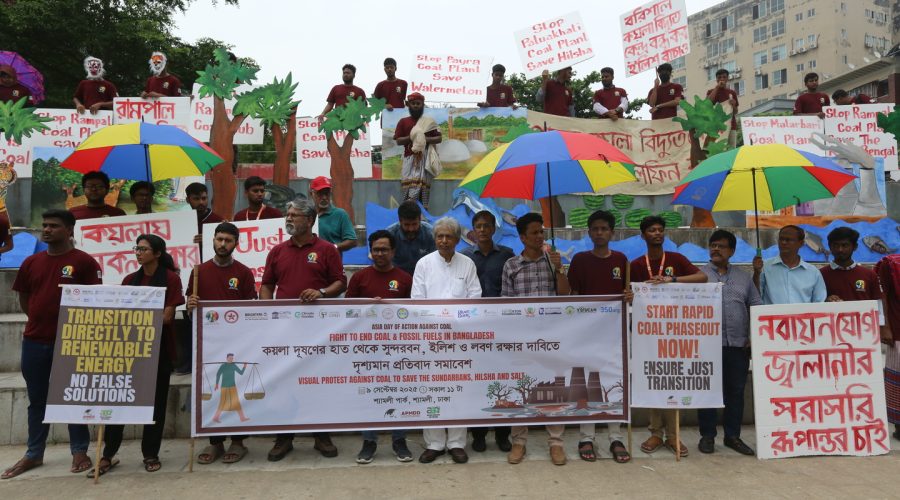Visual Protest Gathering to Protect the Sundarbans, Hilsha and Salt from Coal Pollution - WATERKEEPERS BANGLADESH
- Activities
- Visual Protest Gathering to Protect the Sundarbans, Hilsha and Salt from Coal Pollution
- September 9, 2025
- 2nd admin
Coal is the main cause of worldwide climate disasters, public health and environmental crisis. There is no alternative to halt the production of coal-based energy to fight against climate change and environmental pollution. In these circumstances, on the eve of upcoming UN General Assembly the world leaders are called to take the responsible decision to save the planet. At the call of Asian Energy Network and Asian Peoples Movement on Date and Development, protest gatherings and other activities are being organized in 70 provinces and cities of 9 countries around the world.
On September 9, 2025 at 11 AM a visible, exceptional and symbolic protest gathering was organized jointly by Dhoritri Rokhhay Amra (DHORA), Bangladesh Krishak Federation, Brighters, Centre for Atmospheric Pollution and Studies (CAPS), Climate Frontier, Centre for Participatory Research and Development (CPRD), Environmental Research and Development Alternatives (ERDA), EquityBD, Global Law Thinkers Society (GLTS), Khasia Students Union, Mission Green Bangladesh, OAB Foundation, River Bangla, Riverine People, Shocheton Foundation, Sundarban O Upakul Surakkha Andolon, Waterkeepers Bangladesh, Youth and Environment Development Organization, Young Climate Action Network and 350.org to protect the Sundarbans, Hilsha and Salt from coal pollution. Sharif Jamil was the Main Speaker of the event, while the event was chaired by MS Siddiqui, the Co-convenor of Dhoritri Rokhhay Amra (DHORA), and facilitated by the Editor of River Bangla Foysal Ahmed. Among others President of Bangladesh Krishak Federation SM Badrul Alam, Executive Director of Environmental Research and Development Alternatives (ERDA) Monir Hossain Chowdhury, Chairman of Riverine People Anowar Hossain, Nikhil Chandra Bhadra of Sundarban O Upakul Surakkha Andolon, Director of EquityBD Mostafa Kamal Akonda, Assistant Professor of Sher-E-Bangla Agricultural University Mir Mohammad Ali, Imran Hossain of Centre for Participatory Research and Development and Head of Research and Development Md. Ikbal Faruk spoke on the occasion.
In his speech as the chair, MS Siddiqui, the Co-convenor of Dhoritri Rokhhay Amra (DHORA) said, “We are all being harmed by coal-fired power plants. Therefore, we must immediately formulate and implement a roadmap for transitioning from coal to renewable energy.”
Sharif Jamil, central secretary of Dhoritri Rokhhay Amra (DHORA), said, “No one can support the destruction of our priceless resources like the Sundarbans, Hilsa, and salt, not just for power generation.” Without Sundarbans, the whole Southern Part of Bangladesh will be devastated. So, to save the Sundarbans, Rampal Thermal Power Plants to be cancelled. On the other hand, Hilsha is our priceless national resource. Creating obstacles in the way of Hilsa movement by establishing the Taltoli Thermal Power Plant in Barisal and the Patuakhali Thermal Power Plant in Kalapara is against the national interest and the aspirations of the people. Similarly, Bengalis cannot live even a day without salt. Therefore, to protect salt, coal-based power plants in Banshkhali and Matarbari and surrounding industries must be controlled.
The speakers said, like other countries around the world, in Bangladesh the coal-fired power plants are causing pollution and serious livelihood and health crises. Previous governments established 3 power plants in the name of power generation and industrialization, one at Rampal in Bagerhat district, one in the middle of Taltoli and Kalapara in Barguna and Patuakhali districts, and the other in the middle of Maheshkhali and Banshkhali in Cox’s Bazar and Chittagong districts. These are the areas where we have natural resources. These are known as Rampal, Payra and Matarbari Hubs. Although the people of our country have been protesting against the establishment of these power plants, the previous government has recklessly continued them. Some factories have caused terrible environmental and humanitarian disasters soon after they opened. The condition of the Sundarbans and the Pashur River is dire due to pollution from the Rampal Power Plant. Hilsa and watermelon production has almost been destroyed because of Payra Power Plant. The Matarbari Power Plant has caused a severe crisis in salt and betel nut production, which has become a cause of food insecurity for the entire country as well as the lives and livelihoods of a large number of farmers and fishermen.
Newslinks:



















